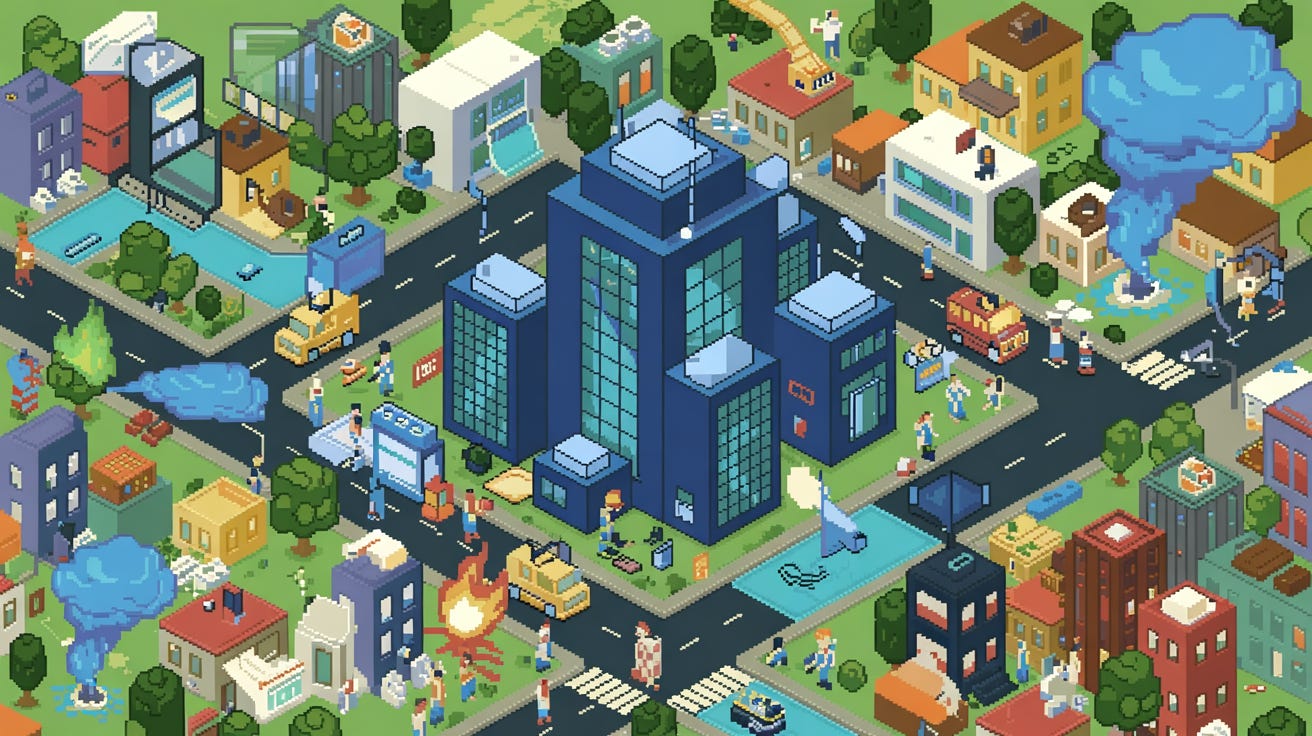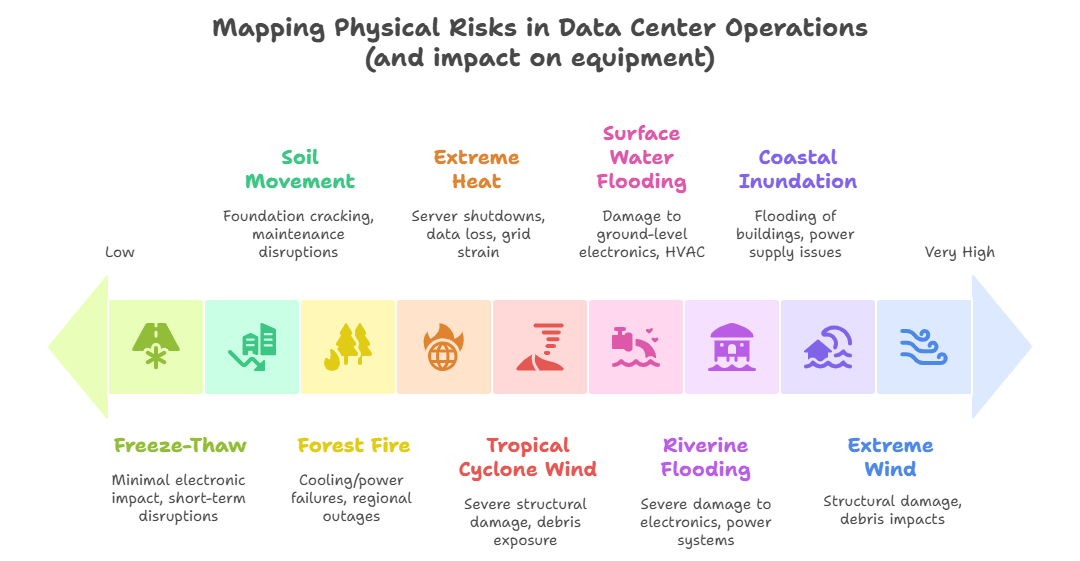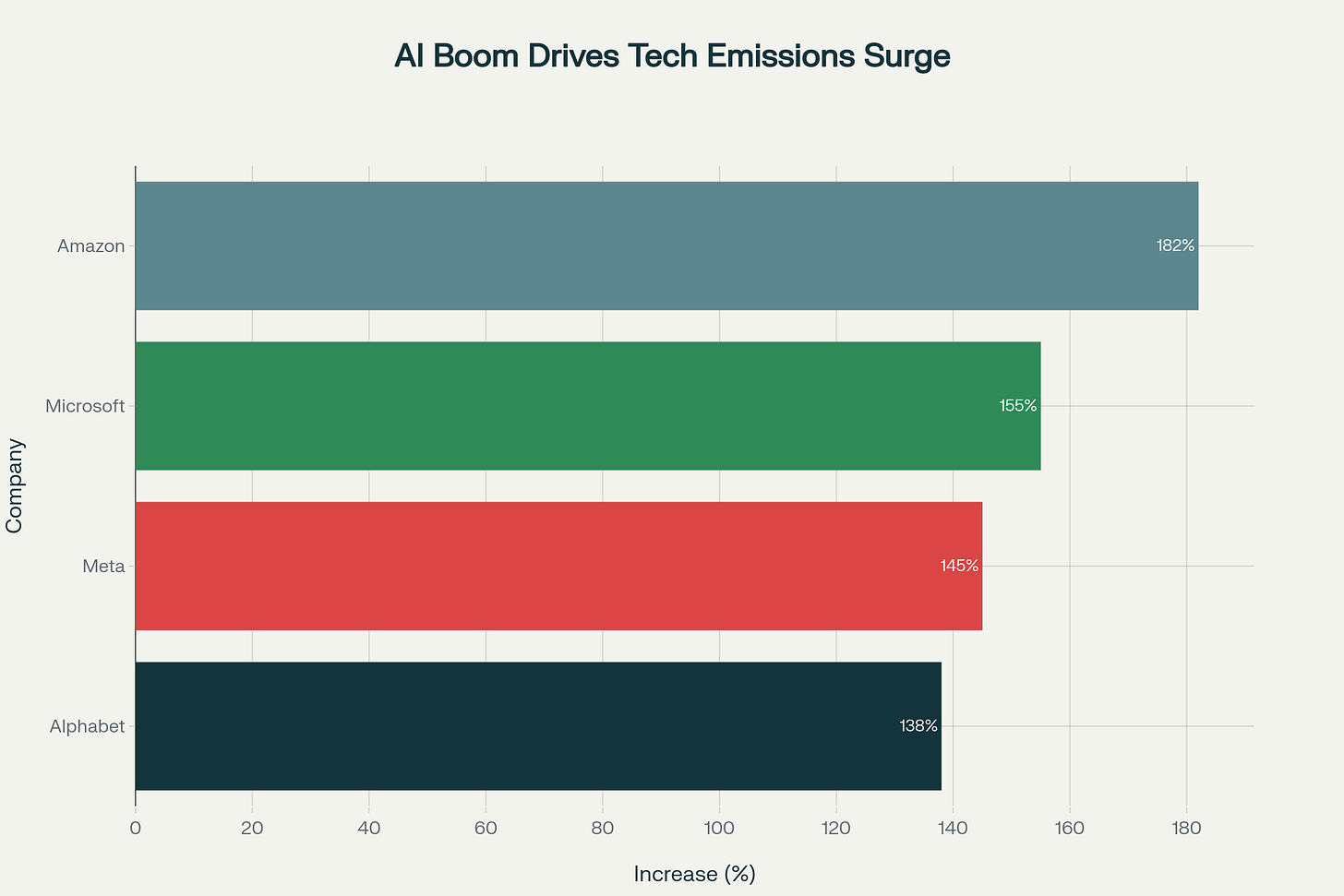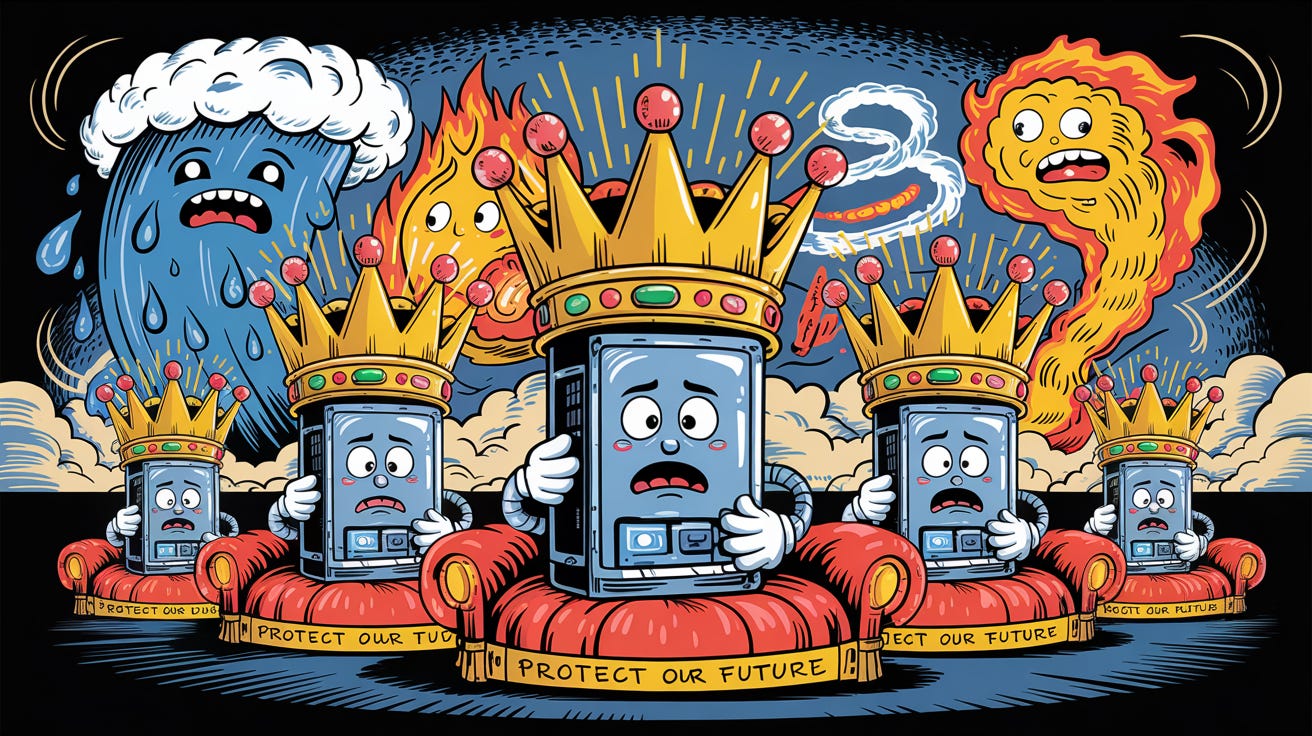Globetrottin': Data Centers Get Their SimCity Disaster Moment
Climate change is like a bored SimCity Mayor, I guess 🤷♂️
I unpack how climate change makes our world weird one take at a time, so you don’t have to!
If you grew up in the 90s, 2000s, or are on a retro bender, you have likely played SimCity, a game you can spend thousands of hours on building a city, only to destroy it out of boredom later.
Well, a few recent reports suggest that Data Centers are entering their own SimCity moment, increasingly subject to countless extreme weather events. This time, it’s not a bored mayor behind them. It’s climate change.
Data Centers are the key to much of our modern lives, allowing us to discover new proteins, predict the weather, and save all those videos you’ll never watch. You know, important things. But thanks to climate change, their ability to save us from buying clunky hard drives may be at peril.
And if that’s the case, will everything be ok, or will we return to the floppy disk?💾 Will we see insurance premiums climb so high, tech giants will need a GoFundMe campaign? Should you give them your lunch money? 💸
In other words: What happens next? Let’s find out 👇
Everyone Loves Data Centers (?)
Data Centers have been a fixture of modern life for nearly 20 years, allowing humanity to ditch the local hard drive and move to the cloud ☁️. Despite their pivotal role over the past two decades, they have only recently gained fame, thanks to the rise of Generative AI and the record-numbers Tech Giants are investing in building, maintaining and upgrading them.
It’s almost impossible these days to open the news without some reference to data centers. Because data centers are the backbone of modern AI infrastructure, it seems like everyone loves them. Well, except those who have to live next to them.
The companies that build and maintain data centers, be they tech giants or investors, spend a lot of money on them, and they count on the ROI📈 and go to great lengths to protect them.
Recent news articles have raised awareness to how energy-intensive AI is, with OpenAI CEO, Sam Altman, telling users how much energy they waste by thanking ChatGPT. Data centers are the man behind the curtain.
Now it turns out there’s another hidden cost to your obsession with thanking algorithms: Climate change.
Risks, they are a-coming
Our weekly take is centered around two recent reports that were published by XDI and Verisk Maplecroft, which send out a stark warning to the data center and tech industries: Watch out, your precious data centers are at risk!
Both reports look into how data centers are becoming increasingly at risk from extreme weather and other physical calamities as a result of climate change. The results are not pretty.
Ok, what gives?
XDI’s encompassing report defines 8 different risks that data centers are exposed to. Not all are born equal. Thanks to Napkin.ai, we can easily visualize them:
As you can see, these hazards are likely to get worse as our climate deteriorate, and the number of calamitous events increases over time. For example, we are already starting to see 1-in-a-1000 years floods becoming much more common.
Each hazard creates a different kind of risk for data centers, impacting equipment and operations differently. But all are problematic at some level.
Ok, how bad is it?
Erhm… pretty bad.
Reports have looked at nearly 9,000 data centers worldwide and have reached a few jarring conclusions; large portions of global data centers infrastructure is currently at risk, and this risk is expected to grow significantly by 2050.
In fact, the XDI report found that by 2050, if nothing is done, 7.13% of data centers will be at high risk, while 19.6% will be at moderate risk. The Verisk report found that 80 out of 100 of the leading data centers in the world are at high risk. They also found that heat stress for data centers is rapidly rising, creating excess risk for many major hubs worldwide.
Oh, the irony.
It’s a little bit ironic that the one thing tech giants thought they can ignore deprioritize is coming back to bite them in the behind: emissions.
Tech companies, while promising to reduce their carbon footprint, have effectively changed course when the AI frenzy began, and their emission skyrocketed:
To be fair, tech companies are also driving much of the innovation in power purchasing and often source their power from renewable sources. An example of this was shown in this week’s edition of our very own Time Machine, with Google’s landmark deal with Brookfield. Still, their emissions are… not doing so hot. Or maybe they are doing so hot 🤷♂️
So why do I think this is ironic? well, in effect, tech companies have prioritized compute over emissions, rushing to build more capacity, one data center after another, only to have their crown jewels threatened by the very thing they tried to ignore deprioritize.
In reality, the increased threat landscape caused by climate change means a lot of things that data center operators and owners deeply care about: Disruptions, equipment failure, damage to electronics, etc. These are disruptions that they cannot afford, thanks to the incredibly competitive AI race. There’s no room for error or failure. Just think about how upset you got the last time you couldn’t get access to the 1,000,000 selfies you took during your honeymoon trip.
So, in turn, this elevated risk might cause data centers owners and operators to build more of these compute beasts to create more buffer. While this is great for investors, it’s not great for the environment, creating more emissions and accelerating climate change.
Oh, the Reconfiguration
As you know, I’m not here to lament or gloat. I’m also not here to say “I told you so” (because I didn’t, really). I’m here to look for (and at) the Reconfiguration.
In this case, we have almost a reverse Reconfiguration. It’s evident that climate change did not bring about the rise in demand for energy (in this case, it’s AI). Instead, AI-driven growth in demand for energy is accelerating climate change and releasing more CO2 into the atmosphere.
So, what happens next? A few options come mind:
Skyrocketing Insurance
In this scenario:
Climate change makes extreme weather more likely
➡️Insurance premiums rise, and insurance becomes prohibitively expansive💰
➡️Tech companies slow down construction and figure out something else
➡️You don’t get a new model every 5 minutes 🤦♂️
Equipment Damage
In this scenario:
Climate change causes physical damage to sensitive equipment
➡️Tech companies buy A LOT more equipment, putting pressure on supply chains and commodity markets
➡️critical components, rare earth elements and related commodities become more expensive.
➡️You get a new model every 5 minutes, but you can’t pay for it because subscription costs skyrocket 📈 🤦♂️
Safe Havens and Broken Cities
In this scenario:
Climate change makes certain places more dangerous
➡️Tech companies relocate their operations to “safe havens” (if these even exist…)
➡️Cities that currently house Data Center hubs lose their revenue base and experience deterioration
➡️Some cities experience civil unrest and upheaval
Of course, there are probably more Reconfiguration scenarios, but I think you get the picture. Given the scale and importance of data centers (and their sheer number), each one of these scenarios can have largescale impacts on entire industries and even locations. These scenarios are also likely to trigger meaningful changes to the human ecosystems they operate in, including changing local immigration patterns, insurance premiums and costs of living.
Of course, there’s another possibility altogether: We will figure out how to satisfy our need for computational power without Data Centers.
I Never Needed Those Centers Anyway
In this scenario:
Humanity figures out a different, decentralized architecture that makes Data Centers redundant, without making you buy infinite amount of floppy disks💾
➡️Computational power is distributed and therefore less susceptible to climate risk
➡️Data Centers’ investors lose money, except for those who read this Substack.
I think this last one is a bit hard to believe, but you never know…
Ok, Who Cares
Probably everyone.
But to be more specific…
Operators and owners 🏢: Would probably have to rethink their basic assumptions on data center location strategy and even their construction considerations.
Cities and Municipalities 🏙️: Depending how scenarios play out, they may end up losing significant revenues. But they can also help data centers in adapting and mitigating risks, or offer special benefits to retain centers despite growing risks.
Insurance Companies 🛡️: Might find your business to be in a bind, if you specialize in insuring data centers. Insurers are probably likely to find their fundamentals change with respect to data centers. Investing in asset assessment software and data sources might come in handy… Just sayin’…
Investors 💹: Yeah, you might lose money if you’re not careful. The changes that are coming to the Data Center (physical) landscape will force investors to conduct more thorough, climate-focused due diligence as they decide where to deploy their money.
Startups 🚀: Lots of opportunities to help data centers deal with climate risk through cooling, insulation, extreme weather preparedness and more (if you’re not too busy preventing the crisis from happening)
You 🫵: You just might have some water in your faucet after all…
That’s it for this week
As always, stay tuned to Saturday’s edition of “The Time Machine”, where I tell you what things you should care about this week. As a reminder, I’m still tweaking this newsletter, so if you have suggestions - hit me up!
See you on Saturday, and next week with a brand new take!
Don’t forget to subscribe 🔽
And if you have any comments, thoughts or suggestions, I’d love to hear from you in the comments (I also need the traffic 🤷♂️)









